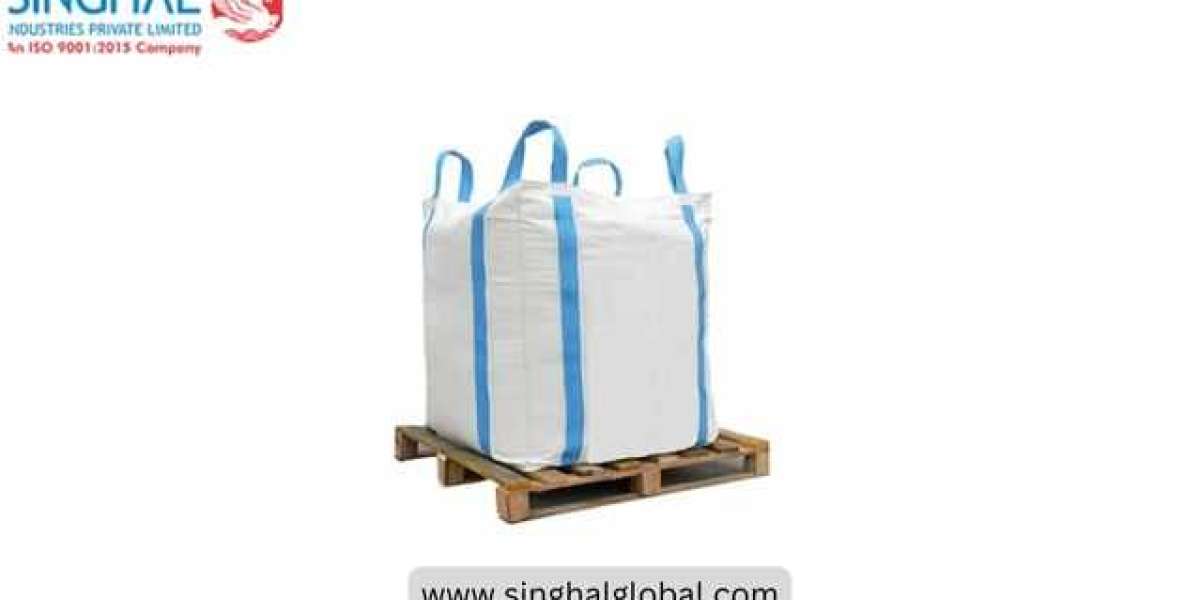Flexible Intermediate Bulk Containers (FIBC), commonly known as bulk bags, are essential tools in industries requiring the transportation and storage of bulk materials. They come in various types, each tailored to specific needs and applications. In this article, we'll explore three distinct types of FIBC bags: PP FIBC bags, PP sling bags, and ventilated FIBC bags, highlighting their features, uses, and benefits.
PP FIBC Bags:
PP FIBC bags, or polypropylene FIBC bags, are among the most commonly used types of bulk bags. They are constructed from woven polypropylene fabric, which provides excellent strength, durability, and resistance to moisture and chemicals. PP FIBC bags come in various sizes, capacities, and configurations to accommodate different materials and handling requirements.
Features:
1. Robust Construction: FIBC bags are constructed from durable woven polypropylene fabric, providing strength and resilience to withstand the rigors of handling and transportation. This robust construction ensures the safe containment and protection of bulk materials during storage and transit.
2. Versatile Configurations: FIBC bags come in various configurations to suit different handling and transportation requirements. These configurations include options such as standard bulk bags, sling bags, ventilated bags, sift-proof bags, and more, offering versatility to accommodate a wide range of materials and applications.
3. Customizable Options: FIBC bags can be customized with a range of options to meet specific needs and preferences. These customization options include size, capacity, lifting loops, discharge spouts, liners, coatings, and specialized features tailored to individual industry requirements, ensuring optimal performance and functionality.
4. Safety Features: Many FIBC bags are equipped with safety features designed to enhance handling efficiency and ensure secure containment of materials. These features may include lifting loops, discharge spouts, top and bottom closures, and other mechanisms to prevent accidents, spills, and contamination during handling and transportation.
5. Certifications and Compliance: FIBC bags are available with certifications and compliance to meet industry standards and regulations for safety, quality, and environmental sustainability. Certifications such as ISO 21898, AIB, HACCP, and UN certifications ensure that FIBC bags adhere to strict quality control measures and are suitable for use in various industries and applications.
Uses:
1. Transporting and storing dry bulk materials such as grains, seeds, and chemicals.
2. Handling construction aggregates like sand, gravel, and cement.
3. Packaging food products, pharmaceuticals, and other sensitive materials requiring protection from contamination.
Benefits:
1. Cost-effective solution for bulk material handling.
2. Versatile and customizable to meet specific application requirements.
3. Resistant to moisture, chemicals, and UV radiation.
4. Space-efficient storage and transportation.
5. Reusable and recyclable, promoting environmental sustainability.
PP Sling Bags:
PP sling bags, also known as sling bags or one-loop bags, are a specialized type of FIBC bags designed for easy lifting and handling. They feature a single lifting loop attached to the top of the bag, allowing for quick and efficient loading and unloading using a forklift or crane. PP sling bags are commonly used in industries where rapid handling of bulk materials is required.
Features:
1. Single Lifting Loop: PP sling bags are characterized by their unique design featuring a single lifting loop attached to the top of the bag. This loop is robustly constructed to withstand heavy loads and facilitates easy lifting and transportation of materials.
2. Durable Construction: Constructed from woven polypropylene fabric, PP sling bags offer exceptional strength and durability. The fabric is resistant to tears, punctures, and abrasions, ensuring the integrity of the bag even in demanding industrial environments.
3. Various Sizes and Capacities: PP sling bags are available in a range of sizes and capacities to accommodate different material handling requirements. Whether transporting small quantities or large volumes of bulk materials, there are PP sling bags suitable for various applications.
4. Customizable Options: Manufacturers offer customization options for PP sling bags to meet specific needs and preferences. These options may include the addition of liners, coatings, or special features tailored to the unique requirements of the intended application.
5. Ease of Handling: The single lifting loop design of PP sling bags simplifies handling and transportation tasks. Operators can easily attach lifting equipment such as forklifts or cranes to the loop, enabling efficient loading, unloading, and movement of materials within warehouses, construction sites, or manufacturing facilities.
Uses:
1. Single lifting loop for easy lifting and transportation.
2. Constructed from woven polypropylene fabric for strength and durability.
3. Available in various sizes and capacities to suit different applications.
4. Can be customized with options such as liners and coatings for added protection.
Benefits:
1. Simplified handling and transportation of bulk materials.
2. Reduces the need for additional lifting equipment.
3. Durable construction ensures long-term performance.
4. Suitable for use in diverse industrial environments.
5. Cost-effective solution for materials handling needs.
Ventilated FIBC Bags:
Ventilated FIBC bags, also referred to as breathable FIBC bags, are designed with ventilation features to allow airflow through the bag. This design helps prevent the buildup of moisture and condensation, making ventilated FIBC bags ideal for storing and transporting moisture-sensitive materials.
Features:
1. Breathable Fabric Construction: Ventilated FIBC bags are constructed with specially designed breathable fabric, allowing air to circulate freely through the bag. This breathable material prevents the buildup of moisture and condensation inside the bag, maintaining optimal conditions for the stored materials.
2. Moisture Prevention: The breathable fabric of ventilated FIBC bags effectively prevents moisture-related issues such as mold, mildew, and product degradation. By allowing air to flow through the bag, these bags help to mitigate the risk of moisture accumulation, particularly in humid environments or during prolonged storage periods.
3. Ventilated Panels or Mesh Inserts: Ventilated FIBC bags may feature strategically placed ventilated panels or mesh inserts to enhance airflow. These panels or inserts are integrated into the bag's design to maximize ventilation while still providing sufficient strength and support for the contained materials.
4. Protection for Moisture-Sensitive Materials: Ventilated FIBC bags are ideal for storing and transporting moisture-sensitive materials such as agricultural products (seeds, grains, nuts), pharmaceuticals, and chemicals. The enhanced airflow provided by these bags helps to preserve the quality and integrity of the materials by minimizing the risk of moisture damage.
5. Versatility and Customization: Like other types of FIBC bags, ventilated FIBC bags offer versatility and customization options to meet specific application requirements. They are available in various sizes, capacities, and configurations, allowing businesses to choose the most suitable option for their needs. Additionally, ventilated FIBC bags can be customized with features such as lifting loops, discharge spouts, and liners for added convenience and functionality.
Uses:
1. Storing and transporting agricultural products such as seeds, grains, and nuts.
2. Handling hygroscopic materials that are prone to moisture absorption.
3. Ideal for use in humid environments or during long-term storage.
Benefits:
1. Maintains product quality by preventing moisture-related damage.
2. Extends the shelf life of moisture-sensitive materials.
3. Allows for safe storage and transportation of agricultural products.
4. Versatile design suitable for various industries and applications.
5. Promotes airflow to minimize the risk of mold and mildew growth.
Conclusion:
In conclusion, ventilated FIBC bags stand out as essential tools for industries requiring the safe and efficient storage and transportation of moisture-sensitive materials. With their breathable fabric construction and strategically placed ventilated panels or mesh inserts, these bags provide optimal airflow to prevent moisture buildup and maintain product integrity.
FAQs (Frequently Asked Questions):
1. What are the advantages of using PP FIBC bags over other types of bulk packaging?
PP FIBC bags offer several advantages, including strength, durability, customization options, and cost-effectiveness. Their versatility makes them suitable for a wide range of applications, from food packaging to construction materials handling.
2. How do PP sling bags differ from standard FIBC bags in terms of design and functionality?
PP sling bags feature a single lifting loop for easy handling, whereas standard FIBC bags typically have four lifting loops. This design difference allows for quicker and more efficient loading and unloading of materials, making PP sling bags ideal for applications requiring rapid handling.
3. In what industries are ventilated FIBC bags commonly used, and what are their primary benefits?
Ventilated FIBC bags are commonly used in industries such as agriculture, food processing, and pharmaceuticals, where maintaining product quality is critical. Their breathable design helps prevent moisture buildup, reducing the risk of spoilage and ensuring product integrity during storage and transportation.
4. Can FIBC bags be customized to meet specific requirements, such as size, capacity, and handling features?
Yes, FIBC bags can be customized to suit a variety of requirements. Manufacturers offer options for size, capacity, lifting loops, discharge spouts, liners, coatings, and other features to meet the unique needs of different industries and applications.
5. Are FIBC bags environmentally friendly, and can they be recycled after use?
Many FIBC bags are reusable and recyclable, making them environmentally friendly alternatives to traditional packaging materials. By promoting reuse and recycling, FIBC bags help reduce waste generation and minimize environmental impact, aligning with sustainable business practices.













